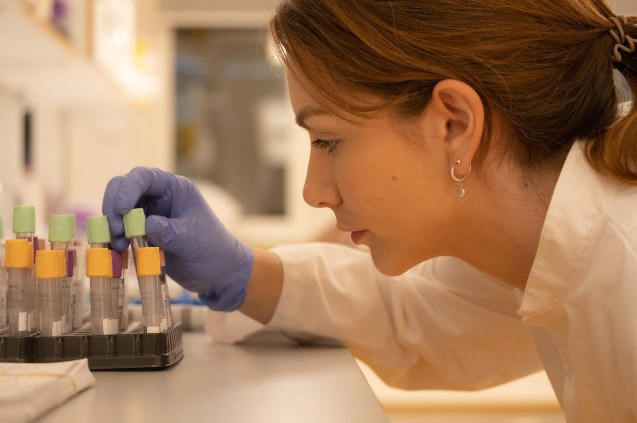Close to 1 000 000 SEK granted from Ekhagastiftelsen to an ongoing study investigating on how the source of dietary protein contributes to a healthy and sustainable diet

Credits for photo: Victor Castro-Alves
Researchers from Örebro University conducting dietary interventions with plant- and animal-based protein sources are aiming to create a methodological framework, including the discovery and validation of novel biomarker panels to decipher the impact of plant-based protein intake on health biomarkers.
One of the challenges with these kind of studies is that each biological sample contains thousands of metabolites, and there are approximately 22 million bacterial genes in our intestinal microbiota. In this project, cutting-edge techniques, such as metagenomics and metabolomics, will be used to analyse blood, urine and faeces samples. Metabolomics will be integrated with microbiota functional annotation by building dependency networks and identifying biomarkers related to protein intake.
For that, the research group are conducting a dietary intervention study with healthy participants dedicated to dietary protein intake to identify sensitive and specific outcome measures using the methodological framework and biomarker panels to improve the understanding of the health effects of plant-based proteins. Moreover, the possibility of predicting biomarkers production will be tested by a colonic in vitro fermentation study using study participants' faecal samples.
A food system enabling the achievement of a more environmentally sustainable diet demands a shift in consuming less animal and more plant-based protein. However, the impact of plant-based proteins on health is unclear since studies have fundamental limitations regarding dietary intake and intraindividual variations.
During the digestion and gut fermentation of proteins, several substances called metabolites are produced, absorbed and excreted. These metabolites can be linked to both positive and negative effects of protein intake. Once a particular physiological process or disease is identified, the metabolites can be named biomarkers.
Since biomarkers are indicative of food intake and its effects on health - identifying markers for plant-based intake would pave the way to achieve a more sustainable and healthy diet, says Samira Prado, a researcher within Örebro University's strategic initiative Food and Health.
In order to study which metabolites are produced and absorbed when one eats plant-based proteins, blood samples can be analysed. Metabolites excreted can be found in urine and faeces. Mapping bacterial genes and metabolites from faeces, urine and blood are important pieces of the puzzle that will increase our understanding of the effects of plant proteins on the human body and health, says Samira Prado.
In this way, we expect to provide a high-resolution picture of bacteria-host-metabolism interactions caused by plant-based proteins and provide new functional insights and useful biomarkers. Ultimately, the methodological framework and biomarkers panels could contribute to tailoring sustainably produced food with health benefits, contributing to a knowledge-based sustainable and competitive food system in the long run.
The project is being carried out within the Nutrition-Gut-Brain Interactions Research Center (@NGBIgutbrain on twitter) at Örebro University (ORU), and is also funded by FORMAS (mobility starting grant and PAN Sweden - ORU) and Food and Health (ORU strategic initiative).
